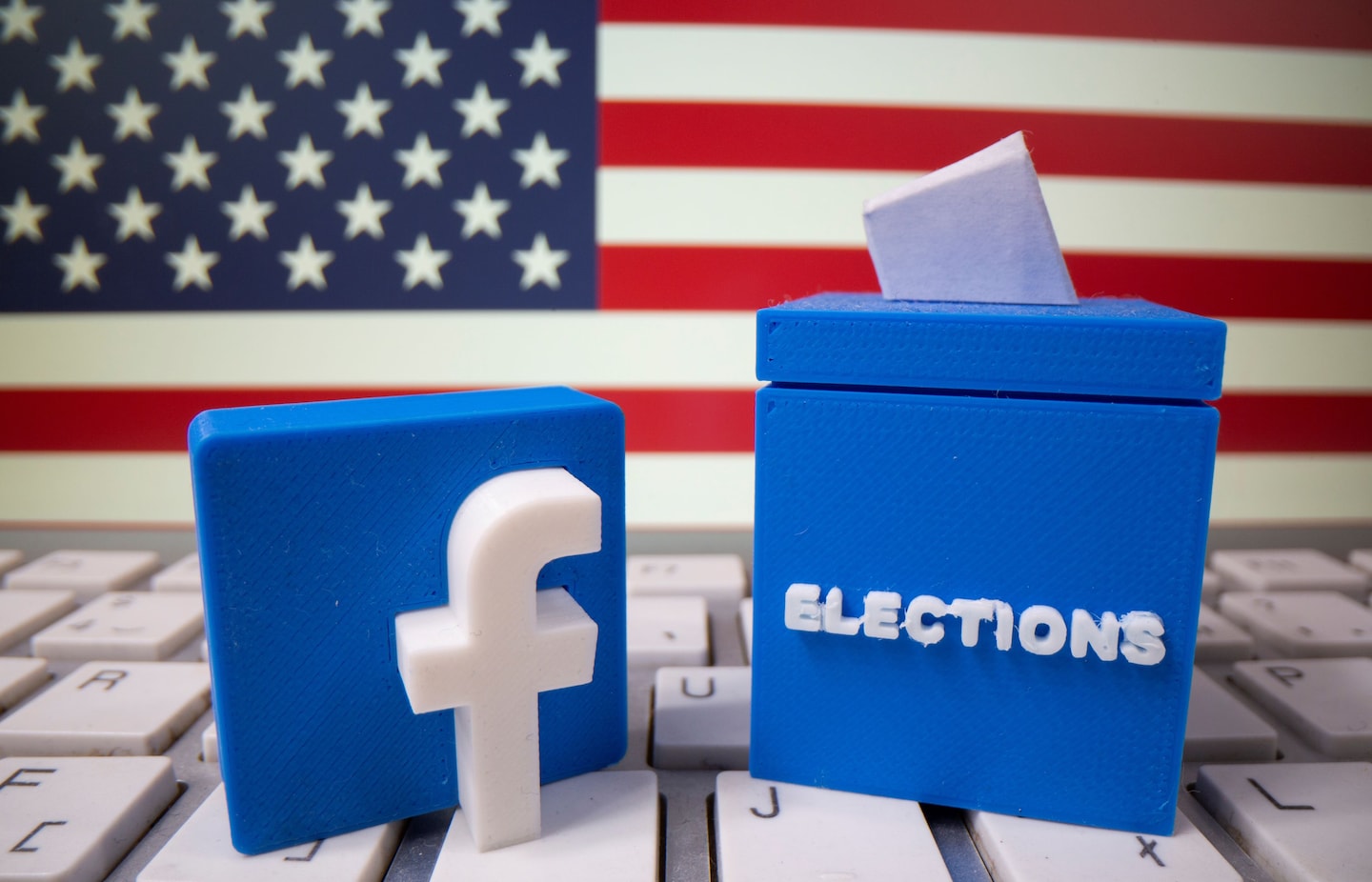Facebook to temporarily halt political ads in U.S. after polls close Nov. 3, broadening earlier restrictions

Facebook executives said such language, including the words “army” and “battle” would be prohibited in the future, but the ad will not be removed retroactively.
The moves by Facebook come in the face of criticism that the company has allowed misinformation and intimidating speech by politicians to run rampant, and that its policy to not fact-check political ads has created a loophole for misinformation that has been exploited repeatedly. The company has previously said it will suspend running new political ads in the week before the election but will allow ads that have previously been approved to continue running.
In a media call, Facebook executives gave a broad overview of the company’s efforts to combat misinformation and foreign interference since the 2016 election, when Russian operatives used its platform to sow disinformation among tens of millions of voters. Since then, the company has marshaled significant resources, including designating 35,000 full-time workers and content moderators to spot violations of its speech policies.
But Facebook has been slow to both enforce and change its policies to adapt to a shifting political reality in which its rules are often flouted. It delayed taking down a page calling for violence during demonstrations against police brutality in Kenosha, Wis., and made exceptions for posts by the president that civil rights activists and employees have said they think broke Facebook’s rules. On Monday, Facebook took down a post in which Trump said the novel coronavirus was less lethal than the flu, the second time the company has removed one of his posts because of misinformation related to the virus.
Trump has refused to commit to a peaceful transfer of power after the election. The company has planned or considered scenarios for how the election could play out, including if Trump or other politicians use their megaphones to dispute the results of the election, Facebook’s head of security policy, Nathaniel Gleicher, said in an interview. At least 70 possibilities have been considered.
To combat that possibility, the company has said it will send out notifications on election night on Facebook and Instagram to share the latest results, in partnership with Reuters. If a presidential candidate or party declares victory prematurely, the company will apply labels to posts saying that the count is ongoing or will label the post with the name of the winner.
“We believe we’ve done more than any other company” to combat misinformation and foreign interference since 2016, Guy Rosen, Facebook’s vice president for integrity, said on a media call. “We thought it was appropriate to introduce these new measures as we head into the final stretch.”
Facebook did not say how long it would continue to suspend ads, but in an internal memo to its sales staff that was obtained by the Washington Post, executives instructed staff to tell advertisers that the ban would last a week.
Twitter has also prepared extensively for the election. The company has explored almost a dozen scenarios of both foreign and domestic disinformation for election night and the week after election day. That planning includes scenarios where people try to dissuade others from voting by saying there are long lines at the polls, and a scenario in which a foreign power hacks documents and leaks them on social media, along the lines of the hacking of Hillary Clinton campaign chair John Podesta’s emails in 2016, according to interviews with executives. The company has banned all political ads and has removed or added warning labels to numerous tweets that break its rules combating voter suppression and election interference, including at least 14 by President Trump.
Facebook said it has removed more than 120,000 posts on Facebook and Instagram between March and September in the United States for violating the company’s voter interference policies and has placed labels on 150 million pieces of information that have been debunked by the company’s third-party fact-checkers.
The company’s policies prohibit representations about voting such as “I hear anybody with a driver’s license will get a ballot,” executives said.
“Our 2.3 million grass-roots volunteers have long been branded the ‘Army for Trump,’ making it glaringly obvious that this new policy is specifically targeted at the president’s campaign. It’s just more proof that Silicon Valley leftists are doing everything they can to protect their own candidate, Joe Biden, who needs others to stick up for him,” said Tim Murtaugh, communications director for the Trump campaign.
Some civil rights advocates praised Facebook’s move.
“Given the unprecedented attacks on legitimate voting methods that are designed to delegitimize the election, these are important steps for Facebook to take to combat disinformation and the premature calling of the results,” said Vanita Gupta, president and chief executive of the Leadership Conference on Civil and Human Rights.
Facebook said it was catching Russian disinformation operations earlier than in the past, “sometimes a year in advance,” Gleicher said during the call. He referenced several Russian-backed disinformation operations that had been taken down in the previous month, including a fake page called PeaceData that targeted more than 200 U.S. journalists.
Gleicher said the company was also preparing for a “hack-and-leak” scenario along the lines of the Russian-backed WikiLeaks dump of the Podesta emails. He said they had not seen this activity, but “we should all be ready in case they or others try again.”
He added that the company would remove leaked material and coverage of such leaks by state media entities.






